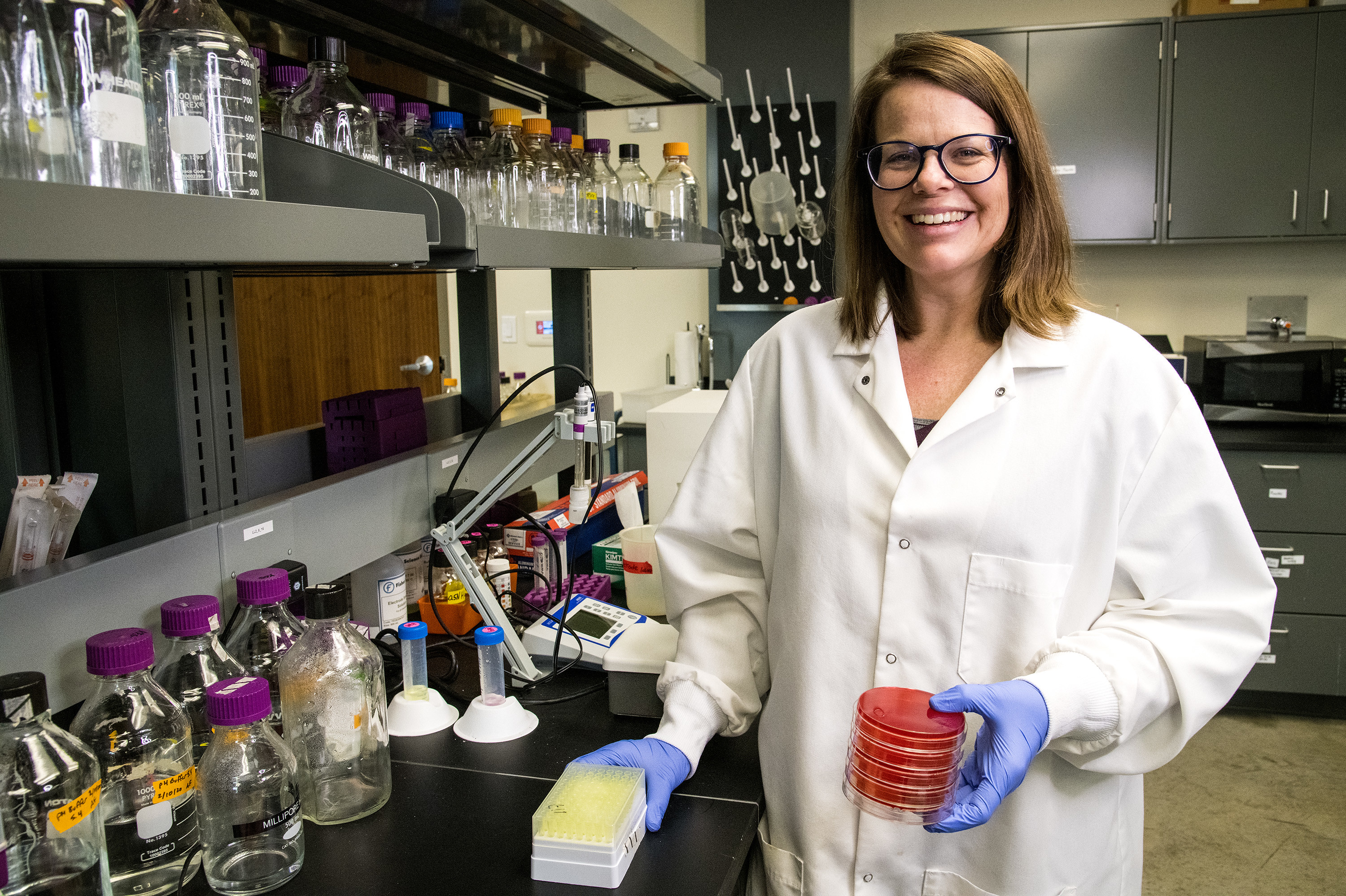Aug. 4, 2020
Gibson explains why soap works against viruses in U of A ‘Short Talks’
By Robby Edwards, Director of Communications
Dale Bumpers College of Agricultural, Food and Life Sciences
Fast facts
- Division of Ag microbiologist explains why soap works against viruses
- “Short Talks” video interview available here
- Related story about cleaning smartphones here: https://bit.ly/AAES-CleanScreens
(315 words)
Related PHOTO of Kristen Gibson: https://flic.kr/p/2iGYzK1
FAYETTEVILLE, Ark. — In a new episode of the University of Arkansas’ Short Talks From the Hill, Kristen Gibson explains how soap destroys respiratory viruses such as coronavirus and offers tips for handling potentially contaminated surfaces.

Gibson is an associate professor of food safety and microbiology for the Arkansas Agricultural Experiment Station, the research arm of the University of Arkansas System Division of Agriculture, and in the Dale Bumpers College of Agricultural, Food and Life Sciences. She studies the fate and transport of pathogens within food systems, focusing on human noroviruses and fresh produce, as well as retail food safety.
When the coronavirus pandemic broke, Gibson's knowledge and expertise were in high demand. Was packaged and take-out food safe? How should it be handled? Gibson addressed these concerns with several media outlets and emphasized the critical importance of hand-washing, something everyone should be doing regularly, she says, even when there isn't a pandemic.
In this new podcast, Gibson explains the effect of soap on respiratory viruses, such coronavirus.
"Respiratory viruses have what is called an envelope. And this is basically … a fatty layer around the virus itself. And so, if you remember a little bit about chemistry from back in the day, soap is designed to break down fat. So, for respiratory viruses, soap will destroy that outer envelope that protects the virus. And then it makes it more susceptible to kind of destroying the virus and making it not able to infect anymore."
To listen to Gibson discuss her research, go to ResearchFrontiers.uark.edu, the home of research news at the University of Arkansas, or visit the "On Air" and "Programs" link at KUAF.com.
Short Talks From the Hill highlights research and scholarly work at the University of Arkansas. Each segment features a university researcher discussing his or her work. Previous podcasts can be found under the 'Short Talks From the Hill' link at ResearchFrontiers.uark.edu.
To learn more about Division of Agriculture research, visit the Arkansas Agricultural Experiment Station website: https://aaes.uark.edu. Follow us on Twitter at @ArkAgResearch and Instagram at ArkAgResearch.
About the Division of Agriculture
The University of Arkansas System Division of Agriculture’s mission is to strengthen agriculture, communities, and families by connecting trusted research to the adoption of best practices. Through the Agricultural Experiment Station and the Cooperative Extension Service, the Division of Agriculture conducts research and extension work within the nation’s historic land grant education system.
The Division of Agriculture is one of 20 entities within the University of Arkansas System. It has offices in all 75 counties in Arkansas and faculty on five system campuses.
Pursuant to 7 CFR § 15.3, the University of Arkansas System Division of Agriculture offers all its Extension and Research programs and services (including employment) without regard to race, color, sex, national origin, religion, age, disability, marital or veteran status, genetic information, sexual preference, pregnancy or any other legally protected status, and is an equal opportunity institution.
About the Dale Bumpers College of Agricultural, Food and Life Sciences: Bumpers College provides life-changing opportunities to position and prepare graduates who will be leaders in the businesses associated with foods, family, the environment, agriculture, sustainability and human quality of life; and who will be first-choice candidates of employers looking for leaders, innovators, policy makers and entrepreneurs. The college is named for Dale Bumpers, former Arkansas governor and longtime U.S. senator who made the state prominent in national and international agriculture. For more information about Bumpers College, visit our website, and follow us on Twitter at @BumpersCollege and Instagram at BumpersCollege.
Media Contact: Fred Miller
U of A System Division of Agriculture
Arkansas Agricultural Experiment Station
(479) 575-5647
fmiller@uark.edu
Related Links